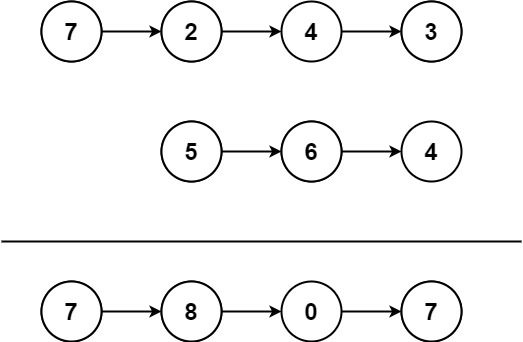Welcome to Subscribe On Youtube
445. Add Two Numbers II
Description
You are given two non-empty linked lists representing two non-negative integers. The most significant digit comes first and each of their nodes contains a single digit. Add the two numbers and return the sum as a linked list.
You may assume the two numbers do not contain any leading zero, except the number 0 itself.
Example 1:

Input: l1 = [7,2,4,3], l2 = [5,6,4] Output: [7,8,0,7]
Example 2:
Input: l1 = [2,4,3], l2 = [5,6,4] Output: [8,0,7]
Example 3:
Input: l1 = [0], l2 = [0] Output: [0]
Constraints:
- The number of nodes in each linked list is in the range
[1, 100]. 0 <= Node.val <= 9- It is guaranteed that the list represents a number that does not have leading zeros.
Follow up: Could you solve it without reversing the input lists?
Solutions
-
/** * Definition for singly-linked list. * public class ListNode { * int val; * ListNode next; * ListNode() {} * ListNode(int val) { this.val = val; } * ListNode(int val, ListNode next) { this.val = val; this.next = next; } * } */ class Solution { public ListNode addTwoNumbers(ListNode l1, ListNode l2) { Deque<Integer> s1 = new ArrayDeque<>(); Deque<Integer> s2 = new ArrayDeque<>(); for (; l1 != null; l1 = l1.next) { s1.push(l1.val); } for (; l2 != null; l2 = l2.next) { s2.push(l2.val); } ListNode dummy = new ListNode(); int carry = 0; while (!s1.isEmpty() || !s2.isEmpty() || carry != 0) { int s = (s1.isEmpty() ? 0 : s1.pop()) + (s2.isEmpty() ? 0 : s2.pop()) + carry; // ListNode node = new ListNode(s % 10, dummy.next); // dummy.next = node; dummy.next = new ListNode(s % 10, dummy.next); carry = s / 10; } return dummy.next; } } -
/** * Definition for singly-linked list. * struct ListNode { * int val; * ListNode *next; * ListNode() : val(0), next(nullptr) {} * ListNode(int x) : val(x), next(nullptr) {} * ListNode(int x, ListNode *next) : val(x), next(next) {} * }; */ class Solution { public: ListNode* addTwoNumbers(ListNode* l1, ListNode* l2) { stack<int> s1; stack<int> s2; for (; l1; l1 = l1->next) s1.push(l1->val); for (; l2; l2 = l2->next) s2.push(l2->val); ListNode* dummy = new ListNode(); int carry = 0; while (!s1.empty() || !s2.empty() || carry) { int s = carry; if (!s1.empty()) { s += s1.top(); s1.pop(); } if (!s2.empty()) { s += s2.top(); s2.pop(); } // ListNode* node = new ListNode(s % 10, dummy->next); // dummy->next = node; dummy->next = new ListNode(s % 10, dummy->next); carry = s / 10; } return dummy->next; } }; -
# Definition for singly-linked list. # class ListNode: # def __init__(self, val=0, next=None): # self.val = val # self.next = next class Solution: def addTwoNumbers( self, l1: Optional[ListNode], l2: Optional[ListNode] ) -> Optional[ListNode]: s1, s2 = [], [] while l1: s1.append(l1.val) l1 = l1.next while l2: s2.append(l2.val) l2 = l2.next dummy = ListNode() carry = 0 while s1 or s2 or carry: s = (0 if not s1 else s1.pop()) + (0 if not s2 else s2.pop()) + carry carry, val = divmod(s, 10) # node = ListNode(val, dummy.next) # dummy.next = node dummy.next = ListNode(val, dummy.next) return dummy.next -
/** * Definition for singly-linked list. * type ListNode struct { * Val int * Next *ListNode * } */ func addTwoNumbers(l1 *ListNode, l2 *ListNode) *ListNode { s1, s2 := arraystack.New(), arraystack.New() for l1 != nil { s1.Push(l1.Val) l1 = l1.Next } for l2 != nil { s2.Push(l2.Val) l2 = l2.Next } carry, dummy := 0, new(ListNode) for !s1.Empty() || !s2.Empty() || carry > 0 { s := carry v, ok := s1.Pop() if ok { s += v.(int) } v, ok = s2.Pop() if ok { s += v.(int) } // node := &ListNode{s % 10, dummy.Next} // dummy.Next = node dummy.Next = &ListNode{s % 10, dummy.Next} carry = s / 10 } return dummy.Next } -
/** * Definition for singly-linked list. * class ListNode { * val: number * next: ListNode | null * constructor(val?: number, next?: ListNode | null) { * this.val = (val===undefined ? 0 : val) * this.next = (next===undefined ? null : next) * } * } */ function addTwoNumbers(l1: ListNode | null, l2: ListNode | null): ListNode | null { const s1: number[] = []; const s2: number[] = []; for (; l1; l1 = l1.next) { s1.push(l1.val); } for (; l2; l2 = l2.next) { s2.push(l2.val); } const dummy = new ListNode(); let carry = 0; while (s1.length || s2.length || carry) { const s = (s1.pop() ?? 0) + (s2.pop() ?? 0) + carry; // const node = new ListNode(s % 10, dummy.next); // dummy.next = node; dummy.next = new ListNode(s % 10, dummy.next); carry = Math.floor(s / 10); } return dummy.next; } -
// Definition for singly-linked list. // #[derive(PartialEq, Eq, Clone, Debug)] // pub struct ListNode { // pub val: i32, // pub next: Option<Box<ListNode>> // } // // impl ListNode { // #[inline] // fn new(val: i32) -> Self { // ListNode { // next: None, // val // } // } // } impl Solution { fn create_stack(mut head: Option<Box<ListNode>>) -> Vec<i32> { let mut res = vec![]; while let Some(node) = head { res.push(node.val); head = node.next; } res } pub fn add_two_numbers( l1: Option<Box<ListNode>>, l2: Option<Box<ListNode>> ) -> Option<Box<ListNode>> { let mut s1 = Self::create_stack(l1); let mut s2 = Self::create_stack(l2); let mut dummy = Box::new(ListNode::new(0)); let mut carry = 0; while !s1.is_empty() || !s2.is_empty() || carry != 0 { if let Some(val) = s1.pop() { carry += val; } if let Some(val) = s2.pop() { carry += val; } dummy.next = Some( Box::new(ListNode { val: carry % 10, next: dummy.next.take(), }) ); carry /= 10; } dummy.next.take() } }